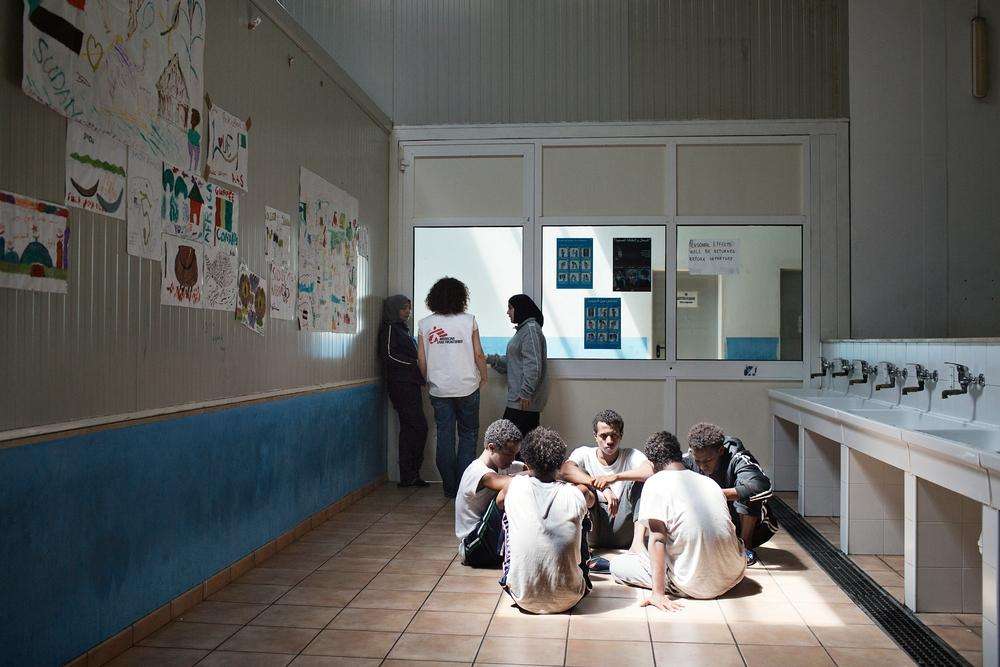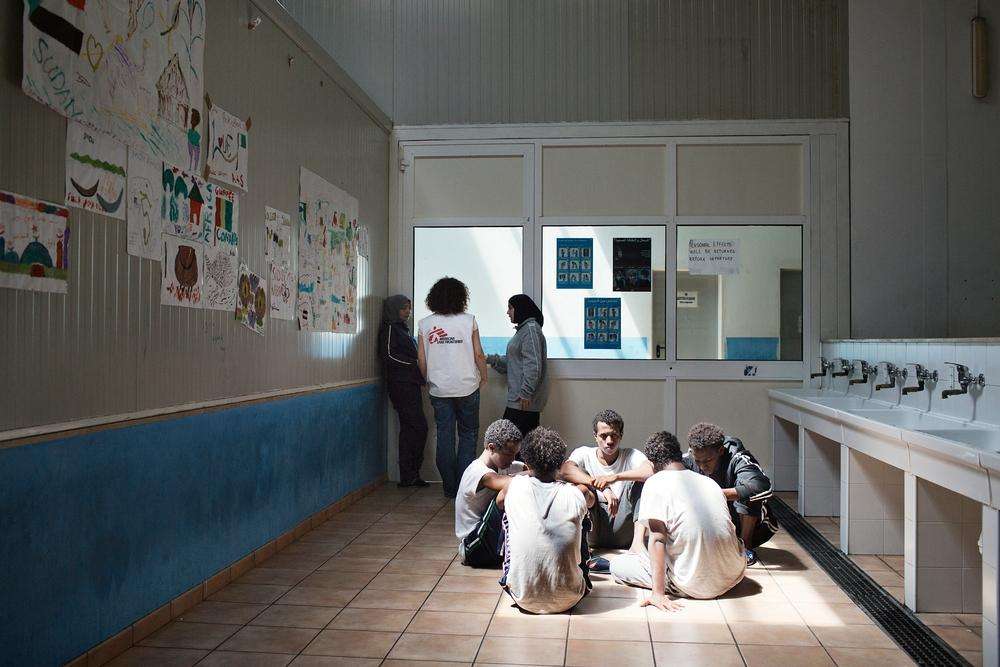More than 35,000 migrants crossed the Mediterranean from North Africa to reach Italy between January and the middle of May this year; last year, more than 170,000 migrants landed on Italy’s shores.
Many of the people rescued from unseaworthy and overcrowded boats arrive on the island of Sicily. In the port of Pozzallo, in southern Sicily’s Ragusa province, migrants are greeted at the dock by a Doctors Without Borders/Médecins Sans Frontières (MSF) medical team, working alongside staff from the Italian Ministry of Health. The MSF team—made up of doctors, nurses, and cultural mediators—screens people for health issues and provides them with medical assistance, both in the hours after they disembark and during their stay in the primary reception center.
In the secondary reception center in Ragusa province, where migrants await the results of their asylum claims, two MSF psychologists are on hand to provide psychological support. They provide both one-off counseling sessions and longer-term support, and refer those with more serious mental health issues to a psychiatrist.
Below are the stories of three individuals who, despite facing grave dangers, survived the journey from their homes and across the Mediterranean.
In Syria, Dreams of Football Stardom Shattered by War
|
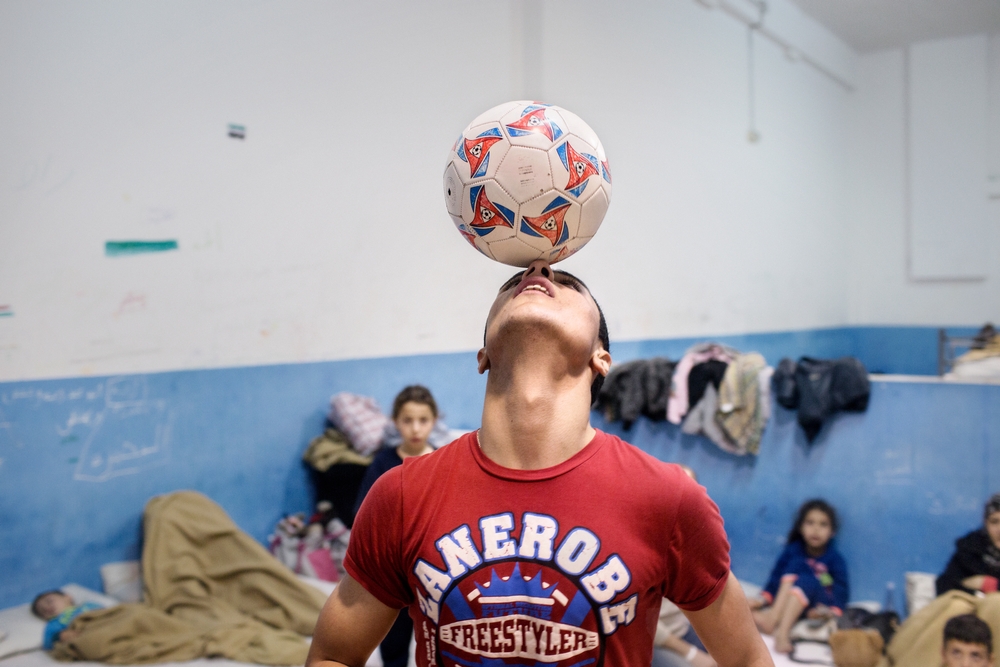
|
Mohamed always dreamed of a career in international football. He was a striker, wearing number 10. At the age of 17, he was captain of Syria’s national youth team, despite being their youngest player, having scored a record 64 goals in 52 matches.
But on April 15, he left all this behind, escaping Syria to risk everything on a rickety boat across the Mediterranean.
“Where is our star?,” “Our star shouldn’t have left us,” and “He’s gone to Germany,” are some of the posts on Mohamed’s Facebook page, alongside photos and videos of his prowess on the football pitch.
When the war started, Mohamed was so caught up in football that he took little notice. But soon the conflict began to encroach on daily life. Explosions became more and more frequent as he took the bus to his training sessions, forcing passengers to throw themselves onto the floor between the seats. Meanwhile, Mohamed’s eighteenth birthday was looming, bringing with it the prospect of forcible conscription into the Syrian army.
One day, in the middle of a match, a bomb exploded on the football pitch, killing one of his teammates. Mohamed realized he did not want to carry on.
“We decided to leave Syria to protect Mohamed’s future,” says his father.
Accompanied by his father and uncle, Mohamed crossed the border to Turkey and made his way to the port city of Mersin, on the eastern Mediterranean. Though only a few hundred kilometers away, the 24-hour journey was fraught with risk. They had to cross the mountains on foot, bargain for transport, avoid human traffickers—all against a backdrop of gunfire and explosions.
In Mersin, they found passage to Europe on an old merchant ship, into which they were squeezed alongside hundreds of other Syrians. On the second day, the boat started to take on water; by the time they were rescued, the boat was barely afloat. It was five more days before they landed on the coast of Sicily.
Mohamed sits on a camp bed in the migrants’ reception center in Pozzallo, surrounded by Syrian families. The wall behind him is covered with pinned drawings, messages written in Arabic, Syrian flags, and a picture of a leaking boat known as "the death ship."
Mohamed’s gaze is serious and determined, suggesting someone who, despite all the difficulties, will not easily give up on his ambitions.
“I hope that European clubs will read my story and help me pursue my dream to play football,” says Mohamed. “I would like to get to Germany and play for Borussia Dortmund, or to Spain and play for Real Madrid. I cannot go back to Syria—I feel like a deserter.”
Someone brings a ball. Mohamed starts to dribble the ball before bouncing it on his head, then transfers it expertly from foot to knee to shoulder.
A circle forms around him. The onlookers clap their hands and shout encouragement. For the first time, Mohamed smiles.
“I Want to Study and Bring Peace Back to My Country”
|
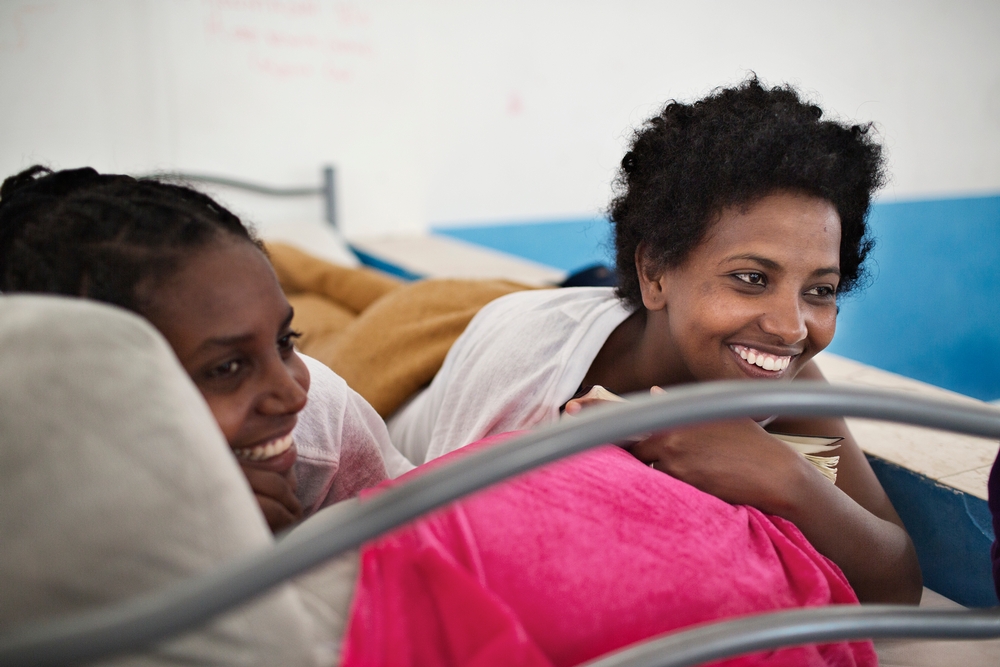
|
The first time that 21-year-old Anna tried to leave Eritrea, she was still a child. Captured and arrested, she was taken to prison, where she was tied up and beaten. On her release, Anna began to concoct a plan to leave the country.
“In Eritrea, escaping is no joke,” she says. “Those who try it risk being executed.”
Anna was still only 16 when she succeeded in crossing the border to neighboring Ethiopia. Hoping to get permission to join her mother in Israel, she stayed in Ethiopia for five years, but her requests were rejected. Finally, she decided to leave Ethiopia to embark on the long and dangerous journey to Europe.
The toughest part, says Anna, was in Sudan. After walking for 13 hours non-stop, she got a lift on a pick-up truck, crammed in with 25 other people. Her feet and legs felt as if they were paralyzed.
In the desert, the truck was stopped by traffickers, who forced them to strip naked as they searched for money and valuables. The traffickers stole everything of value—they even took some people’s shoes, leaving them to continue their journey barefoot.
Anna holds on tightly to a copy of the Bible as she speaks. She doesn’t cry, but her eyes water with unshed tears. “I was scared,” she says. “I didn’t know if I would make it. I prayed a lot, I trusted in God.”
In Khartoum, Sudan’s capital, Anna bumped into people she knew, and together they travelled on to Libya. On the Mediterranean coast, she managed to embark on a wooden boat along with 300 other migrants. Just a few hours after setting off, the boat’s engine caught fire. The passengers managed to put the flames out with buckets of water, but the engine was damaged beyond repair. Someone called the emergency rescue services, who arrived nine hours later and took them to Pozzallo.
Anna sits in the reception center in Pozzallo. Like most Eritreans there, she knows some words of Italian, but thanks to MSF’s cultural mediator, Negash, she is able to tell us her story in her native Tigrinya.
“I am alive and I have a lot of faith in God,” says Anna. “I don’t know where I will go—maybe to Belgium, maybe to England—but I do know what I want to do: I want to study Political Science. One day I want to work to bring peace back to my country. I have a very strong desire to go back to Eritrea.”
Healing Invisible Wounds
|
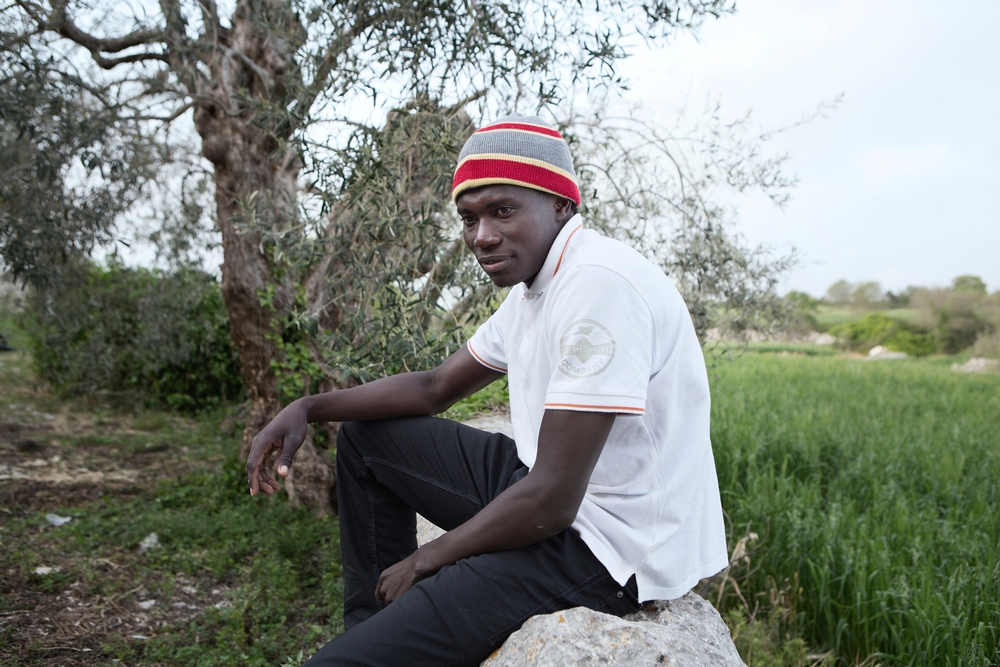
|
When MSF’s team in Pozzallo received the letter from Golleh, it was a special day.
Golleh, 20, from Gambia, arrived in the Sicilian port of Pozzalo on a boat from Libya. He was experiencing severe pains in the abdomen, and MSF doctor Anna, who examined him as soon as he disembarked, diagnosed an intestinal infection that had gone untreated for some months. After a course of antibiotics, Golleh felt much better, and by the time he left the reception center for newly arrived migrants, he was completely cured.
But some scars leave a mark not on the body, but on the mind. It is the job of Pina and Gaia, two MSF psychologists working in Sicily’s Ragusa province, to provide mental health support to migrants struggling to come to terms with their often traumatic experiences.
Gaia met Golleh in the reception center where he was staying as he waited for his asylum claim to be processed. Relieved to see MSF again, Golleh told Gaia why he was there, and what had happened on the way.
Four years ago, in Gambia, both of Golleh’s adoptive parents died. Deprived of his inheritance, living in poverty and completely alone, Golleh decided to leave.
Golleh spent five months in Senegal and a year in Mauritania before making his way to Libya. Unable to pay 500 Libyan dinars, he was imprisoned, and forced to work at gunpoint every day for two months to pay off his ‘debt.’
“They checked me day and night, pointing their guns at me, and they beat me,” says Golleh. On his release, he decided to take a boat for Italy.
“Since 2011, when my father died, the first people to take care of me were you,” he tells Gaia.
That day, Golleh sat down and wrote a letter addressed to the MSF doctor who had treated him when he first arrived in Pozzallo:
Hi Anna, I want to thank you and all of the people in Pozzallo – the doctors in particular. I send my greetings to all of you because today I was very happy to see aunt Gaia, who came from Pozzallo to pay us a visit here at the center.
I am very happy, and I am writing this letter to greet every one of you. I saw the respect you demonstrate towards the human being. You give the right cure to those who are sick. You always smile because you want us to feel good. For this reason I want to thank you and pray for you.
Your friend from Gambia,
Golleh
Thank you for reading my letter!
And Anna’s response?
“Thank you Golleh for writing it! When you’ve made a long journey to escape poverty and persecution, when you’ve been subjected to forced labor in a Libyan prison, when you’ve risked your life crossing the Mediterranean, the very least we can do is to help your visible and invisible scars to heal.”
In 2014, MSF teams in Italy screened the health of 26,081 newly arrived migrants, and carried out 2,594 medical examinations and 700 mental health assessments. During the first three months of 2015, they conducted 1,349 health screenings and 566 medical examinations.
